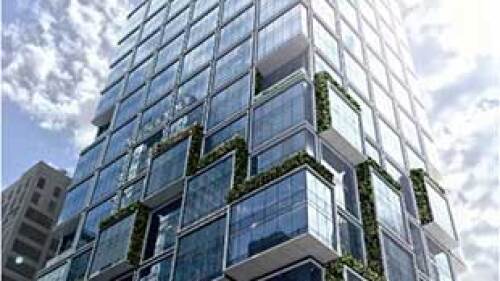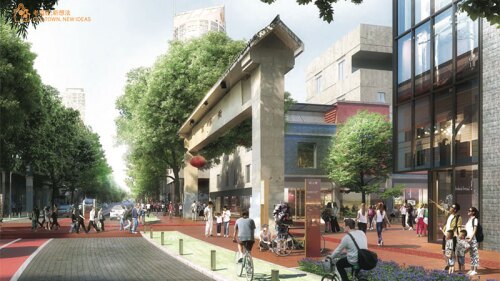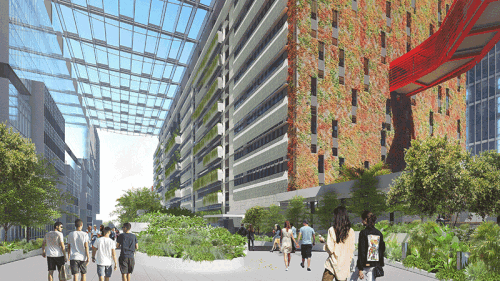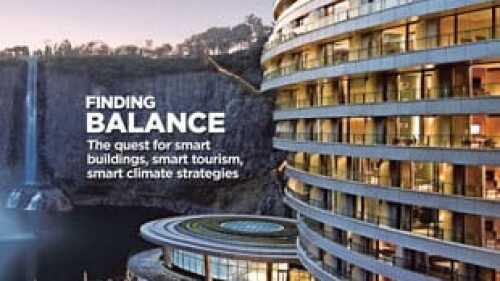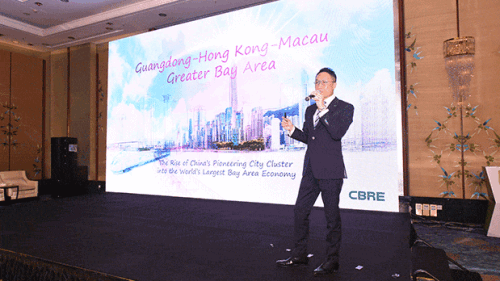Asia Pacific
Insights, trends, and innovation shaping real estate and urban development across the Asia Pacific region’s dynamic markets and cities.
ULI MEMBER–ONLY CONTENT: Hong Kong real estate developer Adrian Cheng is investing heavily in China’s emerging Greater Bay Area, touted as the up-and-coming Silicon Valley and Wall Street of the East. During ULI Asia Pacific’s virtual REimagine conference, Cheng said that his company now controls a land bank of about 290 hectares (nearly 717 acres) in the region.
ULI MEMBER–ONLY CONTENT: The global COVID-19 pandemic promises to accelerate the adoption of property technology (proptech), which lies at the intersection of the roughly $230 trillion global property sector and the nearly $3.4 trillion global technology sector, speakers said in early September during the virtual ULI Asia Pacific REimagine conference.
Thirteen outstanding real estate development projects have been selected as winners of the 2020 ULI Asia Pacific Awards for Excellence. The winners, each of which demonstrates a comprehensive level of quality and a forward-looking approach to development and design, include four projects in China, two in Hong Kong, two in Australia, two in Singapore, and one each in India, Japan, and New Zealand.
Themes of identity, governmental responsibility, and local empowerment in cities were discussed by a small group of experts during a May 20 webinar hosted by ULI Asia Pacific. While the discussion leaders each offered their own talking points, all agreed that governance and design play crucial roles in the establishment of a modern community.
In recent decades, SOM’s urban design work in China has created several successful old town redevelopment planning projects—such as Shanghai Xintiandi and Foshan Lingnan Tiandi—that integrate China’s ancient urban heritage into a new type of urban placemaking, one that celebrates local traditions while also creating immeasurable economic, social, and cultural value. Guangzhou’s Old Town is the latest of these.
When the SARS epidemic surfaced in China in 2003, the impact on domestic real estate was severe but fairly short-lived, with rents and prices rebounding quickly once the outbreak had peaked. The fallout from COVID-19, however, promises to be more profound, as shrinking global demand for Chinese products turns the screw on firms that have only recently restarted operations, said industry experts working in the region.
Kenneth Rhee, executive director of ULI China Mainland, spoke with ULI leader Vincent Lo, chairman of Shui On Land, about his thoughts on the near-term impact of COVID-19 on China’s real estate market and how the urban environment and real estate industry will change.
The Punggol Digital District, set to launch in 2023, will form a fresh nexus between higher education and industrial innovation, with its two anchor institutions being the Singapore Institute of Technology and a new business park developed by JTC Corporation, an industrial property developer and manager.
At the 2020 ULI Singapore Conference, which was held virtually, panelists discussed how hotels have started to offer takeout and delivery to nonguests, in addition to working with the local government to house those under quarantine orders.
Many countries in Asia have successfully mitigated the spread of COVID-19 through a range of strategies that include universal mask use, testing, sophisticated technology for contact tracing, and strict government quarantine and cleaning protocols, according to leading real estate professionals participating in a recent ULI webinar. The participants described impacts on their real estate businesses, and how the real estate industry has been enlisted in the fight against the coronavirus.
Singapore
A new report draws upon Singapore’s successful urbanization experience. Despite its population density, the city-state has consistently ranked favorably in various surveys measuring the livability and sustainability of cities around the globe.
As cities become denser, the cost of high-density parking begins to pencil out for developers—which is when the development of parking that automatically stores and retrieves cars becomes attractive.
Hong Kong
The cover package for the 2019 Asia Pacific special issue is titled “Finding Balance: The quest for smart buildings, smart tourism, and smart climate strategies.” Other topics include “South Korea: Heritage at Jeonju Hanok Village,” “ China: Intercontinental Shanghai Wonderland Hotel,” “Thailand: Dealing with Bangkok’s Climate Challenge,"and “Interview: Chairman Nicholas Brooke.” This special issue will be available at the ULI Asia Pacific conference in Shanghai and mailed to ULI members in Asia.
A massive infrastructure program is interconnecting the cities of China’s Greater Bay Area and opening up a wealth of real estate opportunities. Attendees of the ULI Asia Pacific Leadership Convivium, held in Shenzhen in March, heard two presentations on the region, which includes the cities of Guangzhou, Shenzhen, Zhuhai, Foshan, Huizhou, Dongguan, Zhongshan, Jiangmen, and Zhaoqing as well as the special administrative regions of Hong Kong and Macau.
We are late in the current cycle, and real estate investors are focusing on the potential risks as much as, if not more than, the rewards on offer, according to investors and investment managers discussing global capital markets at the 2018 ULI Asia Pacific Summit in Hong Kong.

